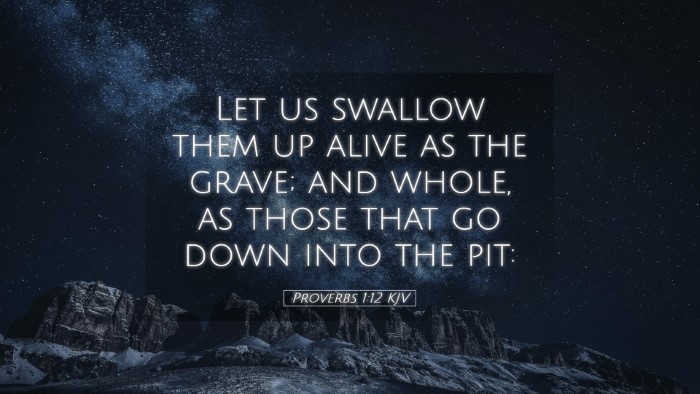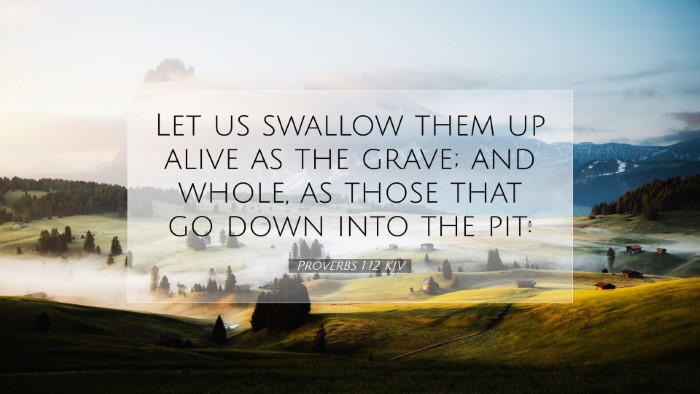Commentary on Proverbs 1:12
Proverbs 1:12 states, "We will swallow them alive like Sheol, and whole, like those who go down to the pit." This verse is rich in metaphorical language and presents a sobering view of human behavior and the consequences of folly. The following commentary draws on insights from public domain sources such as Matthew Henry, Albert Barnes, and Adam Clarke to explore its depth and implications.
Context of the Verse
The opening chapters of Proverbs set the stage for the reader to understand the importance of wisdom, the dangers of folly, and the stark contrast between the two. In this chapter, Solomon introduces the personification of wisdom and folly, providing a pathway for the audience to recognize the significance of making wise choices and steering clear of temptations.
Understanding the Metaphor
The phrase "swallow them alive" serves as a powerful metaphor. Matthew Henry elucidates that it implies an insatiable greed and an unquenchable thirst for wrongdoing that endangers both the perpetrator and their victims. This imagery of being consumed speaks to the fatal consequences that ensue when one indulges in wickedness without consideration for one’s actions.
Sheol and the Pit
The mention of Sheol and the pit in this verse indicates a place of death or the grave, reinforcing the inevitability of consequences for those who engage in destructive behavior. Albert Barnes highlights that this language emphasizes the grave seriousness of sin and folly, suggesting that those who pursue a path of wickedness ultimately face dire consequences, both in this life and beyond.
The Speaker's Perspective
The use of the first-person plural "we" indicates that the speaker is drawing in a group, suggesting a collective mindset that seeks to devour the foolish. Adam Clarke points out that this represents not just an individual pursuit but a communal inclination towards vice, which is foundational in understanding the social dynamics at play in the pursuit of folly.
Exhortation Against Folly
The verse serves as a direct exhortation to the readers to recognize the dangers of associating with those who engage in wickedness. Matthew Henry advises believers to be wary of the seductions of sinners and to avoid their paths, asserting that wisdom will guide one away from such traps. The call to discernment is vital; as folly often masquerades as wisdom, one must be vigilant.
Theological Implications
The implications of this verse resonate through multiple theological themes, particularly the nature of sin and its destructive consequences. It serves as a reminder of the depth of human depravity and the potential for devastation when one abandons the path of righteousness. Albert Barnes emphasizes that the characteristics of sin are such that they do not simply affect the sinner; they extend their impact, leading others astray and bringing death and destruction.
Practical Applications
-
Discernment: This verse encourages individuals, particularly pastors and leaders, to cultivate discernment in their ministry and personal lives. They must evaluate the company they keep and the influence they allow into their sphere.
-
Wisdom vs. Folly: The choice between wisdom and folly is a continuous theme in Proverbs. Pastors and theologians should teach the necessity of choosing wisdom grounded in a relationship with God, as expressed throughout Scripture.
-
Awareness of Consequences: Understanding the consequences of sin is crucial for both personal accountability and pastoral care. Leaders should be equipped to counsel those who are struggling with the effects of foolish decisions.
Encouragement to Pursue Wisdom
In the light of the stark realities of folly depicted in this passage, there is an underlying call to pursue wisdom actively. The wisdom literature encourages readers to receive instruction and prioritize understanding. Adam Clarke observes that the pursuit of wisdom leaves no room for folly, leading to a life marked by peace, purpose, and fruitfulness.
Conclusion
Proverbs 1:12 presents a vivid picture of the dangers of folly through potent imagery and warnings. By examining this verse alongside the insights of respected commentators, we gain deeper understanding and awareness of the seriousness of sin and the importance of pursuing wisdom. Pastors, students, and theologians are urged to reflect on these teachings, embrace the pursuit of wisdom, and guide others toward a life that honors God and avoids the perilous paths of folly.


